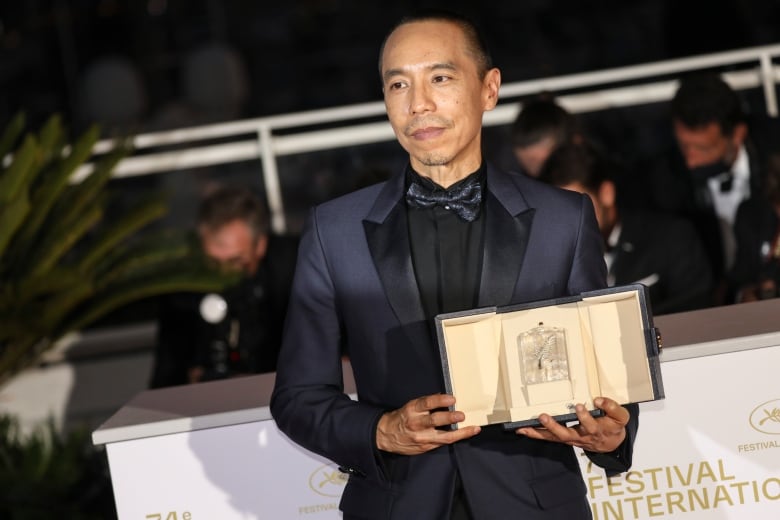Titane, a wild body-horror thriller featuring sex with a car and a surprisingly tender heart, won the Palme d’Or at the Cannes Film Festival, making Julia Ducournau just the second female filmmaker to win the festival’s top honour in its 74-year history.
The win on Saturday was mistakenly announced by jury president Spike Lee at the top of the closing ceremony, unleashing a few moments of confusion. Ducournau, a French filmmaker, didn’t come to the stage to accept the award until the formal announcement at the end of the ceremony. But the early hint didn’t diminish from her emotional response.
“I’m sorry, I keep shaking my head,” said Ducournau, catching her breath. “Is this real? I don’t know why I’m speaking English right now because I’m French. This evening has been so perfect because it was not perfect.”
After several false starts, Lee implored Sharon Stone to make the Palme d’Or announcement, explaining: “She’s not going to mess it up.” The problems started earlier when Lee was asked to say which prize would be awarded first. Instead, he announced the evening’s final prize, as fellow juror Mati Diop plunged her head into her hands and others rushed to stop him.

Lee, himself, spent several moments with his head in his hands before apologizing profusely for taking a lot of the suspense out of the evening.
“I have no excuses,” Lee told reporters afterward. “I messed up,” he added. “As simple as that.”
Long-awaited triumph
Lee was the first Black jury president at Cannes. His fellow jury members were: Maggie Gyllenhaal, Melanie Laurent, Song Kang-ho, Tahar Rahim, Mati Diop, Jessica Hausner, Kleber Mendonca Filho and Mylene Farmer.
Ducournau’s win was a long-awaited triumph. The only previous female filmmaker to win Cannes’ top honour — among the most prestigious awards in cinema — was Jane Campion for The Piano in 1993.

In 2019, another genre film — Bong Joon-Ho’s Parasite — took the Palme before going on to win best picture at the Academy Awards, too. That choice was said to be unanimous by the jury led by Alejandro Gonzalez Inarritu, but the award for Titane — an extremely violent film — this year’s jury said came out of a democratic process of conversation and debate. Gyllenhaal said they didn’t agree unanimously on anything.
In Titane, which like Parasite will be distributed in the U.S. by Neon, Agathe Rousselle plays a serial killer who flees home. As a child, a car accident leaves her with a titanium plate in her head and a strange bond with automobiles. In possibly the most-talked-about scene at the festival, she’s impregnated by a Cadillac. Lee called it a singular experience.

Cannes’s closing ceremony capped 12 days of red-carpet premieres, regular COVID-19 testing for many attendees and the first major film festival to be held since the pandemic began in almost its usual form. With smaller crowds and mandated mask-wearing in theaters, Cannes pushed forward with an ambitious slate of global cinema. Last year’s festival was completely cancelled by the pandemic.
Strong slate
The slate, assembled as a way to help stir movies after a year where movies shrank to smaller screens and red carpets grew cobwebs, was widely considered to be strong, and featured many leading international filmmakers. The awards were spread out widely.
The grand prize was split between Asghar Farhadi’s Iranian drama A Hero and Finnish director Juho Kuosmanen’s Compartment No. 6.

Best director was awarded to Leos Carax for Annette, the fantastical musical starring Adam Driver and Marion Cotillard that opened the festival.
Jurors also split the jury prize. That was awarded to both Nadav Lapid’s Ahed’s Knee, an impassioned drama about creative freedom in modern Israel; and to Thai filmmaker Apichatpong Weerasthakul’s Memoria, a meditative film starring Tilda Swinton.
Caleb Landry Jones took home the best actor prize for his performance as an Australian mass killer in the fact-based Nitram by Justin Kurzel. Renate Reinsve won best actress for Joachim Trier’s The Worst Person in the World. Best screenplay went to Ryusuke Hamaguchi’s Drive My Car, a Haruki Murakami adaptation he penned with Takamasa Oe.





More Stories
Fair share: the right office solution can take finding the right partner
Ontario faces crew shortages, aircraft issues in fight against wildfires | Globalnews.ca
Refugee attends open house at Downtown Eastside affordable housing facility – BC | Globalnews.ca